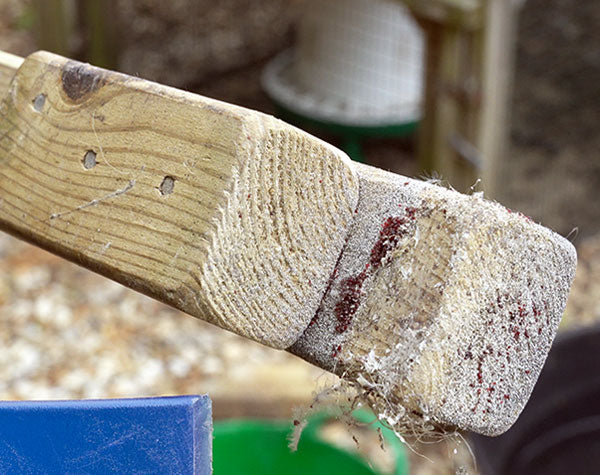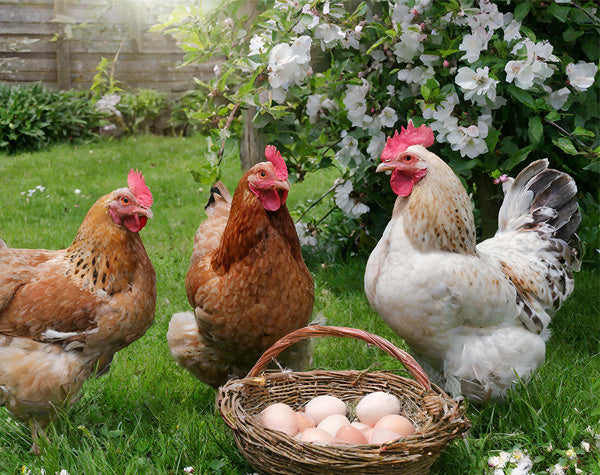What is Fly Strike?

Fly Strike on Chickens (or any animal) can be deadly. It is caused by flies laying eggs on the chicken’s skin, often around the vent.
When these eggs hatch, the larvae begin feeding on the living tissue (which is gruesome to find), and will naturally lead to serious health issues and, if not treated promptly, potentially death.
Yes, the images are AI generated as any real photos are just unpleasant at best!
Causes and Risks
Fly strike can happen most often in warmer months when flies are more active. Chickens that are older, have poor hygiene, or suffer from diarrhoea, have open wounds, are at a higher risk of becoming victims of fly strike.
The most susceptible area is the vent, especially in hens that have soiled feathers due to droppings. Flies are simply attracted to dirt, foul smells and poo!
Poor husbandry is, frankly, a significant risk factor for fly strike. Coops that are not cleaned regularly or are damp, can become breeding grounds for flies (as well as unhealthy smelly bacteria).
Chickens that have dirty feathers are more prone to attracting flies. Any chicken with a wound, whether from pecking injuries or other causes, is at a higher risk of developing fly strike.
Symptoms and Detection
The early signs of fly strike can be subtle but will progress rapidly. Initially, the affected chicken may just appear restless, frequently pecking at or preening a specific area of its body.
Look closer and there might be signs of irritation, reddening, or a foul smell emanating from the vent. Of course, the presence of live maggots is not only horrible but a clear indication of an advanced case and, if too far advanced, it may not be possible to save the bird.
If not spotted soon enough the condition will worsen and the chicken will become lethargic, stop eating, and clearly be in distress. The area infested by maggots can quickly become necrotic, with the skin and underlying tissues being eaten away. Without timely intervention, fly strike can lead to septicaemia (blood poisoning) and death.
Treatment

Immediate treatment is crucial if you find any of your chickens with Fly Strike. The first step involves removing the affected bird from the flock to prevent further stress and fly attraction.
The infested area should be thoroughly cleaned, with all maggots removed using tweezers – this is so unpleasant you will undoubtedly never want to see it again! The wound should then be disinfected with an antiseptic solution e.g. Antiseptic Skin Spray.
In severe cases, a visit to the Vet may be required for antibiotics or further treatment.
Preventing Fly Strike
Prevention through good hygiene routines and vigilance is the most effective strategy against fly strike. Regular cleaning and sanitising of the coop, ensuring proper ventilation, and maintaining dry bedding can significantly reduce the risk of flies laying eggs in the hens’ environment.
Use drying disinfectant powders like Stalosan F, or Flyte Sanitising Powder, both inside the coop and around the run area. It will reduce bacteria and smells. These are desiccant powders so they reduce moisture in the coop (that also leads to bacteria build up) and will repel flies.
It is especially important that you inspect your birds regularly, especially during summer months, as this can help detect and address any hygiene issues or injuries before they attract flies. Keep the birds clean and try to avoid poo lingering on their feathers.

Using purpose-made fly traps, like Redtop Fly Catchers, or insect repellents containing citronella, around the coop can also help control the fly population.
Ensuring that chickens are healthy, well-nourished, and free of stress is another key factor in preventing fly strike, as healthy birds are less likely to become targets for flies.
In conclusion - Fly Strike is a potentially fatal condition so needs prompt attention and effective prevention by good husbandry. By maintaining a clean and healthy environment for chickens, regularly inspecting the flock, and addressing any health issues immediately, poultry keepers can protect their birds from the devastating effects of fly strike. Vigilance and cleanliness is everything!
- - - -
Fly Strike in Chickens ©Flyte so Fancy 2024. Author: Anne Weymouth (Director, Flyte so Fancy Ltd). Reproduction of part or all of this text is only possible with the express permission of Flyte so Fancy Ltd.



